For start-ups and small businesses, platforms like Ecwid feel like the best choice due to their simplicity and feature-rich systems. But as your business expands, you might start searching for Ecwid alternatives that offer even more to keep up with your growing needs. So, what is better than Ecwid?
Don’t worry; we are here to help you answer that question! In this article, we’ll walk you through the top 10 options below:
- PrestaShop
- Square Online
- Shopify
- WooCommerce
- BigCommerce
- SamCart
- Magento
- Shopify Plus
- Salesforce Commerce Cloud
- Wix
Without further ado, let's get started!
What Are The Best Ecwid Alternatives?
Despite its impressive popularity, Ecwid is far from perfect, especially if you're craving more SEO control, greater scalability, or a bigger app selection. Hence, we have explored the top alternatives below to help you find the ideal match:
- Need a higher level of customization? Open-source options like PrestaShop or Magento 2 are truly the powerhouses.
- For expansive collections of apps and extensions, Shopify, WooCommerce, and Wix will be terrific alternatives.
- If Ecwid's SEO limitations get you down, consider turning to PrestaShop, Shopify, and WooCommerce.
- Regarding budget options, Square Online's free plan and Wix's Light plan ($17/month) will let you start selling right away.
- Lastly, Shopify Plus and Salesforce Commerce Cloud are both popular enterprise-level options, designed for established businesses that are scaling fast.
Ready for a seamless Ecwid migration?

Top 10 Ecwid Alternatives to Consider
Now that you've gotten a brief glimpse of some top Ecwid alternatives, let's explore each option's pricing, advantages, and drawbacks in the following section:
1. PrestaShop
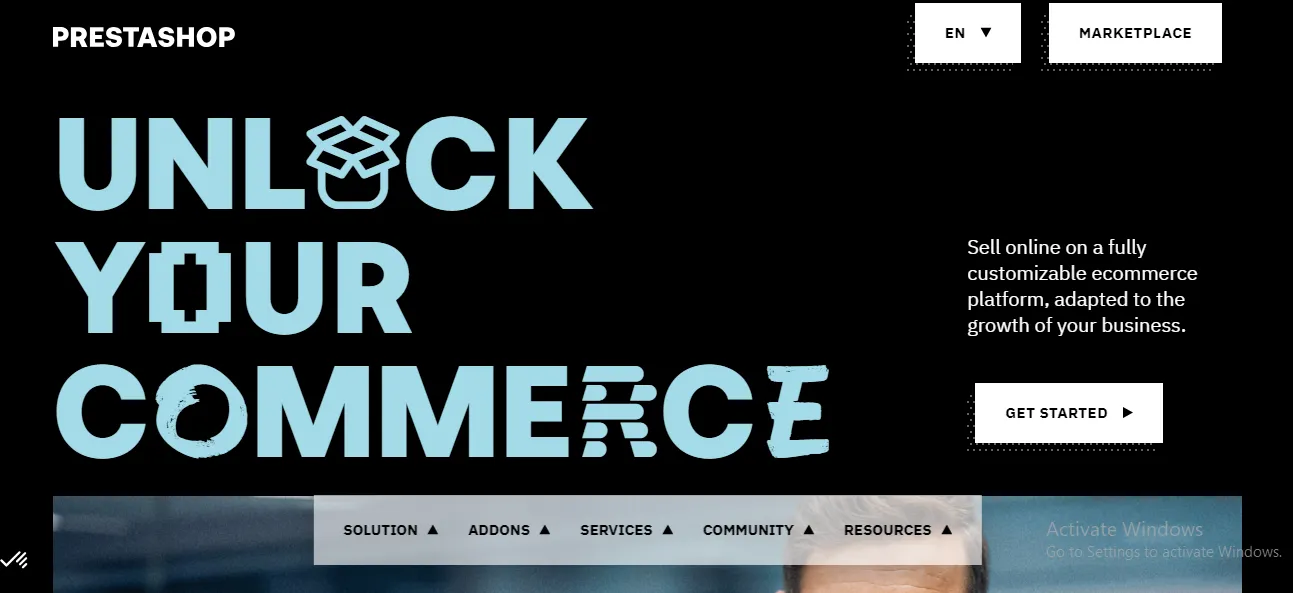
At the top of our list of Ecwid alternatives is PrestaShop, the versatile open-source eCommerce platform that's been making waves since its launch in 2007. It gives you the freedom to shape your online store exactly how you want, all while offering powerful built-in features.
One of its standout advantages is that PrestaShop doesn't put a cap on how many products you can list. It doesn't matter whether you're selling a few items or a massive inventory; there are no limits! That's something Ecwid can't offer unless you splurge on their Unlimited plan.
And when it comes to SEO, PrestaShop really shines. You can fine-tune your URLs and easily set up redirects to boost visibility and search rankings. Compare that to Ecwid, where URL customization isn't available across all plans, and it's clear that PrestaShop has the upper hand.
Nevertheless, PrestaShop's open-source flexibility comes with a bit of a learning curve compared to Ecwid's more user-friendly setup. Plus, one major drawback is its credit-based customer support system. Simply put, while other platforms often provide support free of charge, you'll need to pay for it here.
PrestaShop | Pros | Cons |
 | + Budget-friendly + Scalable + Multilingual options (75 languages) | + Require technical knowledge for setup + Credit-based customer support + Security issues |
All in all, if you're running a store with an extensive product range or need to dig deep into custom SEO strategies, PrestaShop is a fantastic choice (check out our PrestaShop review here). However, for smaller businesses or those who prefer a more plug-and-play solution, Ecwid's simplicity may still hold some appeal.
2. Square Online

Do PrestaShop's vast customization options feel a bit daunting for you? Then Square Online's ease of use might be a better alternative, with the added bonus of impressive built-in features.
For starters, let's not forget that Square Online is very budget-friendly compared to Ecwid. Its Premium plan clocks in at just $79/month (annually), a full $10 cheaper than Ecwid's $89/month Premium plan.
What makes Square Online stand out even more is what you get for that price. It offers unlimited listings, plus seamless integration with social selling giants like Facebook and Instagram! Also, while Ecwid makes you shell out extra for a custom domain, Square Online gives it to you free for the first year on all paid plans.
However, Square Online's built-in options fall short compared to Ecwid's more comprehensive offerings (and its app store, featuring only 34 apps, doesn't do much to fill the gap either). Another downside is the lack of immediate customer support: you might find yourself waiting up to two days for a simple response.
Square Online | Pros | Cons |
 Upfront cost: $0 - $79/month | + Very affordable + Unlimited listings + Social media integration + Free domain for the first year (paid plans) + Advanced reports | + Limited customization options + Limited customer support + Transaction fees might add up |
Overall, Square Online is a great fit for small to medium-sized businesses that crave simplicity without compromising on functionality. It also promises amazing integration features if you want to thrive on social media at minimum upfront costs. For more information, you can read our Square Online review.
3. Shopify

As you can see, PrestaShop's learning curve might be a nightmare for beginners, while Squarespace is easy to use but sacrifices flexibility. Here's where Shopify steps in as the perfect middle ground: it's very user-friendly while still giving you endless customization options!
Specifically, aside from the comprehensive built-in settings, Shopify boasts a whopping 215 easily customizable themes and access to 13,000 apps. That is a stark contrast to Ecwid's modest 43 themes and 330 apps. Not to mention, Shopify's POS system is available across both iOS and Android devices, giving it a leg up over Ecwid's iOS-only POS.
Now, you might be asking, “Then why not rank Shopify first?” The answer comes down to its price, which is significantly steeper than Ecwid (and even PrestaShop and Square Online). Check out the table here:
Shopify | Pros | Cons |
 Upfront cost: $25 - $399/month | + Easy to use + 215 themes and 13,000 apps + Built-in Shopify Payments (no transaction fees) + Considerable SEO control | + Data leak controversies + Expensive + No email hosting + Difficult exit |
All in all, Shopify is a great match for businesses that aim for long-term success and don't mind paying a bit more for flexibility. It offers the best of both worlds — easy to use yet packed with advanced customization options. For more insights, you can read our Ecwid vs Shopify comparison here.
4. WooCommerce

Another great Ecwid alternative for limitless customization options is WooCommerce. Imagine having access to 879 WooCommerce extensions (many under $50/month), plus a staggering 59,000 free WordPress plugins! With all these tools at your fingertips, you can customize your store in ways you never thought possible — all without touching a single line of code.
And if dropshipping is your priority, WooCommerce really pulls ahead here. While Ecwid links you up with only 5 dropshipping platforms, WooCommerce offers a whopping 13; you have the freedom to scale your business further and much faster.
On the other hand, the biggest obstacle to keep in mind is that WooCommerce is built for WordPress, meaning you'll need a WordPress site to get started. Also, if choosing the open-source WordPress.org version (instead of WordPress.com), you will definitely have to brace yourself for a bit of a learning curve during installation.
WooCommerce | Pros | Cons |
 Upfront cost: $0 (requiring an existing WordPress site) | + Free + Nearly 900 extensions + Integrates with 13 dropshipping platforms | + No phone support + Works with WordPress websites only + Potential security breaches |
Overall, WooCommerce is ideal for WordPress site owners who need maximum customization, scalability, and options for the future — especially if you’re serious about dropshipping or adding extremely unique features. If you still need more information before deciding, check out our WooCommerce vs Ecwid breakdown.
5. BigCommerce
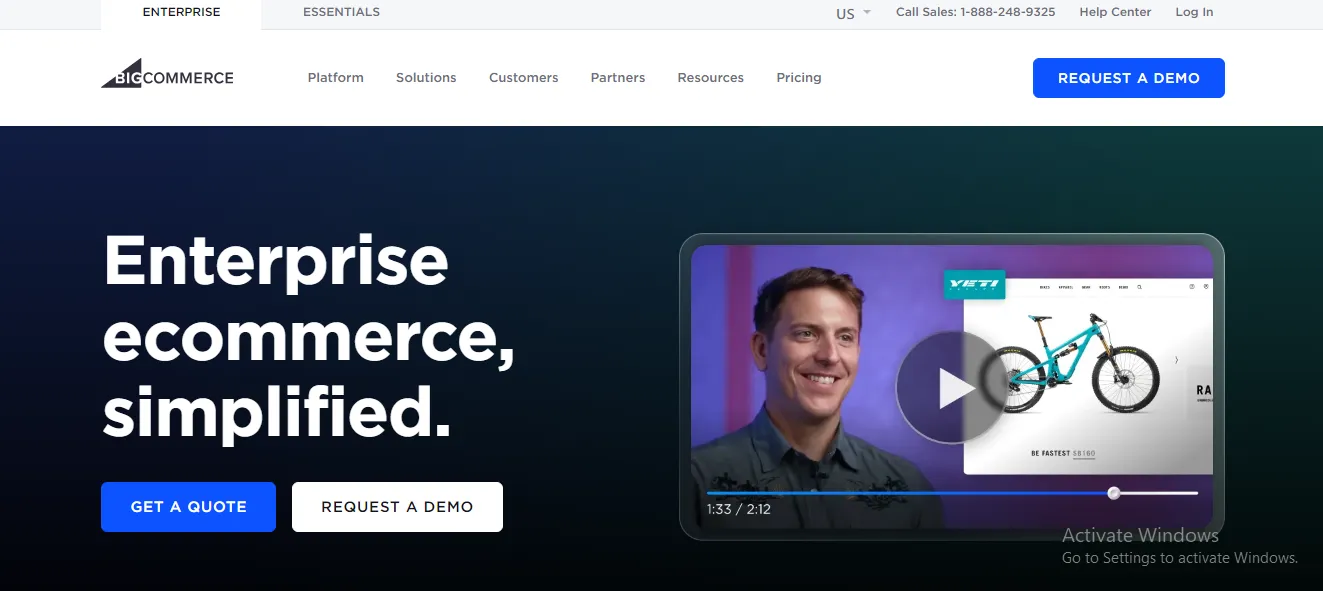
Quite interestingly, both BigCommerce and Ecwid were introduced in the eCommerce scene in 2009. Hence, BigCommerce naturally stands out as a strong Ecwid alternative when merchants compare different platforms.
One notable highlight is that BigCommerce's entry-level Standard plan (priced at $39/month) packs many built-in features that Ecwid only offers in its Unlimited plan (at $105/month). Indeed, with BigCommerce's Standard package, you get:
- Unlimited products
- Unlimited staff accounts
- Gift card functionality
- Built-in reviews and ratings and reviews
- Professional reports (know your business inside out)
- Unlimited file storage and bandwidth.
And that's just the start. As you climb BigCommerce's plan tiers, even more advanced tools become available! Plus, when it comes to design, BigCommerce flexes its muscle with 170+ themes (ranging from free to $400), nearly four times Ecwid's offering of just 43 themes.
Nevertheless, we must say that BigCommerce's built-in inventory management feels quite underwhelming compared to Ecwid, Shopify, or even Square Online. That’s why, despite its subscription-based model, certain customizations (like hiding out-of-stock products) still require some coding. These tasks are just as (if not even more) complicated as some open-source solutions like PretaShop!
BigCommerce | Pros | Cons |
 | + Feature-rich + 170+ themes + Unlimited staff accounts and listings for all plans + 24/7 support | + Not beginner-friendly + Yearly revenue limits for each plan |
All in all, BigCommerce shines for growing/medium businesses that crave powerful features right out of the gate without shelling out for premium plans. However, if advanced, built-in inventory management settings are your top priority, Ecwid or other alternatives might better meet your needs. Check out our BigCommerce vs Ecwid comparison for more information.
6. SamCart
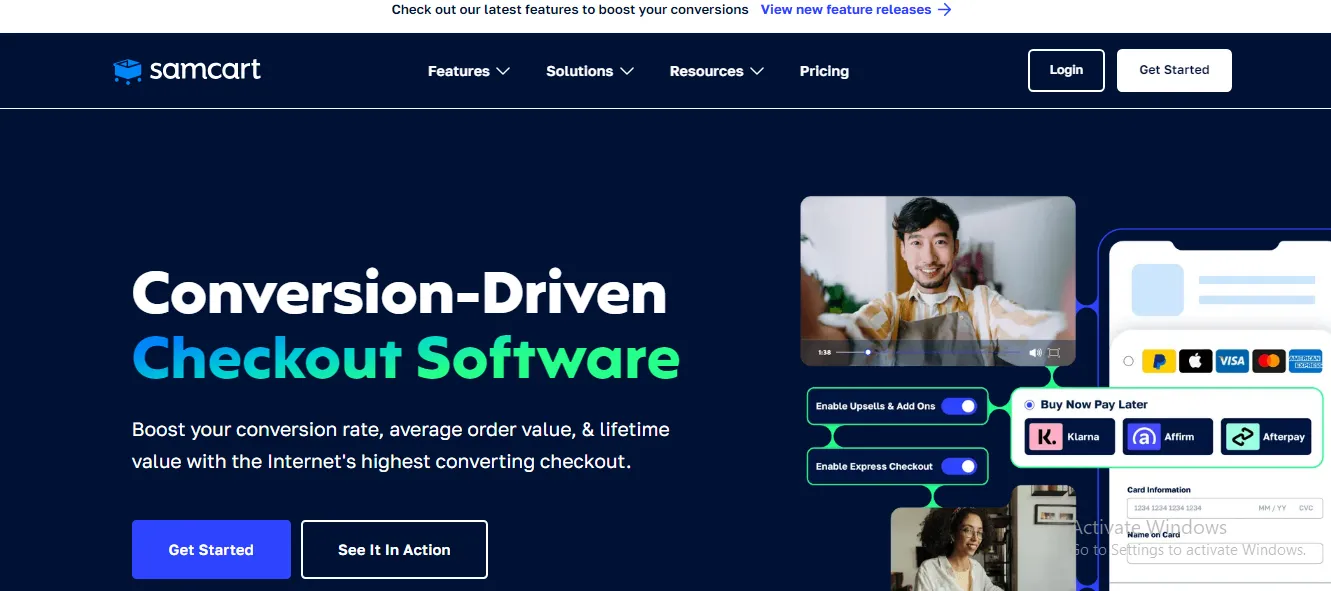
If you're in search of an Ecwid alternative that feels familiar – with a few extra perks – then SamCart is definitely worth considering. Indeed, from our experience, its interface and setup process mirror Ecwid in many ways (e.g., inventory management, shipping, and tax settings). You won't need to waste much time like you might with some other platforms we mentioned.
Furthermore, SamCart steps up the game by including built-in A/B testing (which Ecwid doesn't offer without third-party help). All you have to do is navigate to the Advanced tab in your Product Settings and scroll down to the AB Test section. From there, you can split-test different pages, templates, and designs side by side and figure out which option seals the deal.
Nevertheless, although SamCart shares plenty of features similar to Ecwid, it comes at a much steeper price. Not to mention, since the platform focuses heavily on sales and checkout pages, you'll find its website builders and storefront design to be fairly limited.
SamCart | Pros | Cons |
 Upfront cost: | + Easy setup + A/B testing + Checkout embedding on other platforms | + Limited storefront design options + Expensive + No community feature |
Overall, SamCart shines for businesses that prioritize conversions (testing, tweaking, and improving checkout flow to boost sales). But if you're after a full-featured website builder or a more affordable solution, then Ecwid might still have the edge.
7. Magento
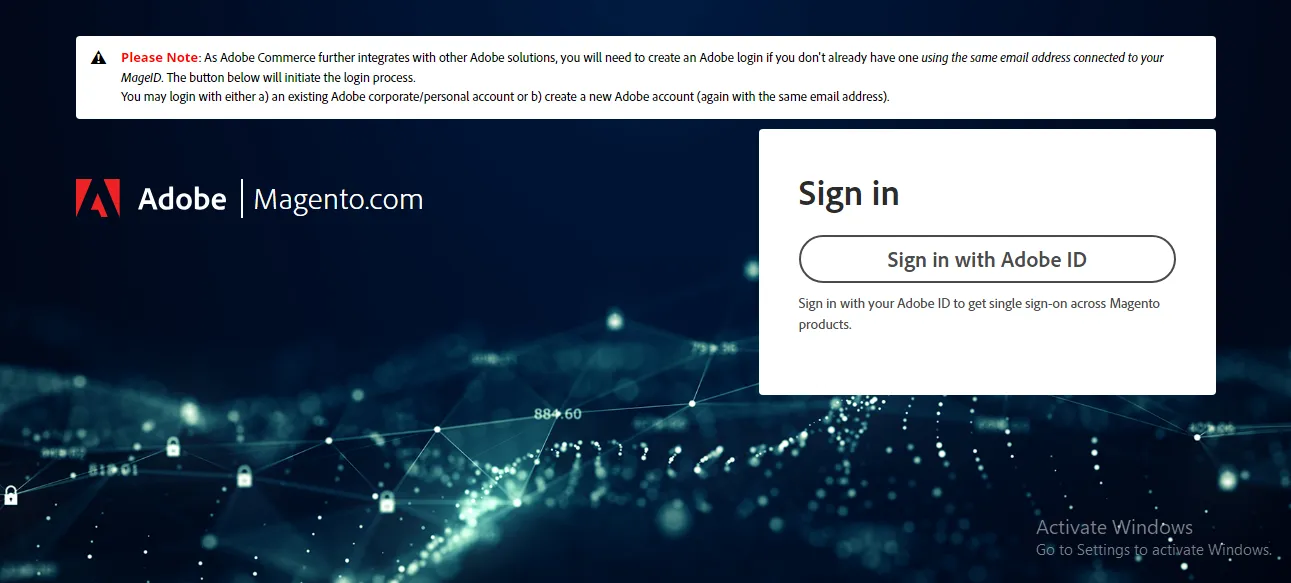
Now, it would be a big miss to overlook Magento as one of the top Ecwid alternatives. It gives you open-source freedom and an unparalleled level of customization that towers over Ecwid and many other subscription-based platforms!
Plus, one of the shining stars is the native B2B functionality, which allows businesses to sell to corporate clients by assigning various user roles and permissions. You can give each of your clients their own tailored dashboard. Even better, the platform can seamlessly merge both B2B and B2C into one powerful platform (accompanied by extensions and APIs) to deliver a truly unique, scalable shopping experience.
Unfortunately, here's where the challenge comes in: Magento 2 is not for the faint of heart. The installation process, for example, is no walk in the park, with over 10 steps to complete from the get-go. Worst of all, unlike Ecwid or even PrestaShop (another open-source competitor), Magento offers no direct customer support. This feels like sailing a ship without a compass for most newcomers.
Magento | Pros | Cons |
 Upfront cost: $0 | + Highly customizable and scalable + Large community (300,000+ members) + Mobile-friendly | + Very steep learning curve + Time-consuming development + Requires powerful hosting + Zero customer support |
Overall, Magento is built for the big leagues — businesses that demand full control and flexibility over their online store. However, for smaller businesses or those without a dedicated tech team, the complexity might be too much to handle. You can check out our Magento review before making your decision or what the Magento video below:
8. Shopify Plus

Is your store experiencing explosive growth – meaning Ecwid is starting to feel a little too small for your big ambitions? Then, Shopify Plus, designed specifically for large-scale enterprises, could be the powerhouse solution you're looking for.
One of the standout features that sets Shopify Plus apart is the ease of creating expansion stores. Sure, Ecwid does let you translate your storefront into 36 languages, but it's still the same site – just with multilingual capabilities. Meanwhile, Shopify Plus lets you launch 9 expansion stores for free (with just $250 per store starting from the 2nd) and gives each store its own unique domain extension: .com, .in, .au, .uk, and more.
And managing all those stores is also a breeze, as Shopify Plus enables bulk invites, edits, and uploads in an instant to help you deal with a growing mountain of transactions and inventory. Even better, Shopify Plus subscribers get exclusive access to the Shopify Plus Academy, a goldmine of guides and tutorials that you won't find with Ecwid or most other platforms.
On the other hand, Shopify Plus has a very hefty price tag, starting at $2300 per month (for a 3-year contract). That's why we rank it lower on our list of Ecwid alternatives.
Shopify Plus | Pros | Cons |
 | + Easy to use + Excellent scalability + High security + Priority customer support | + Very expensive + Limited content management |
All in all, Shopify Plus mostly works best for established businesses that are already successful and need heavy-duty features to keep scaling. (You can check our Shopify Plus review here to gain more insights on this). Other than that, it might be a bit of an overkill for startups, medium-sized stores, or those still in growth mode.
9. Salesforce Commerce Cloud
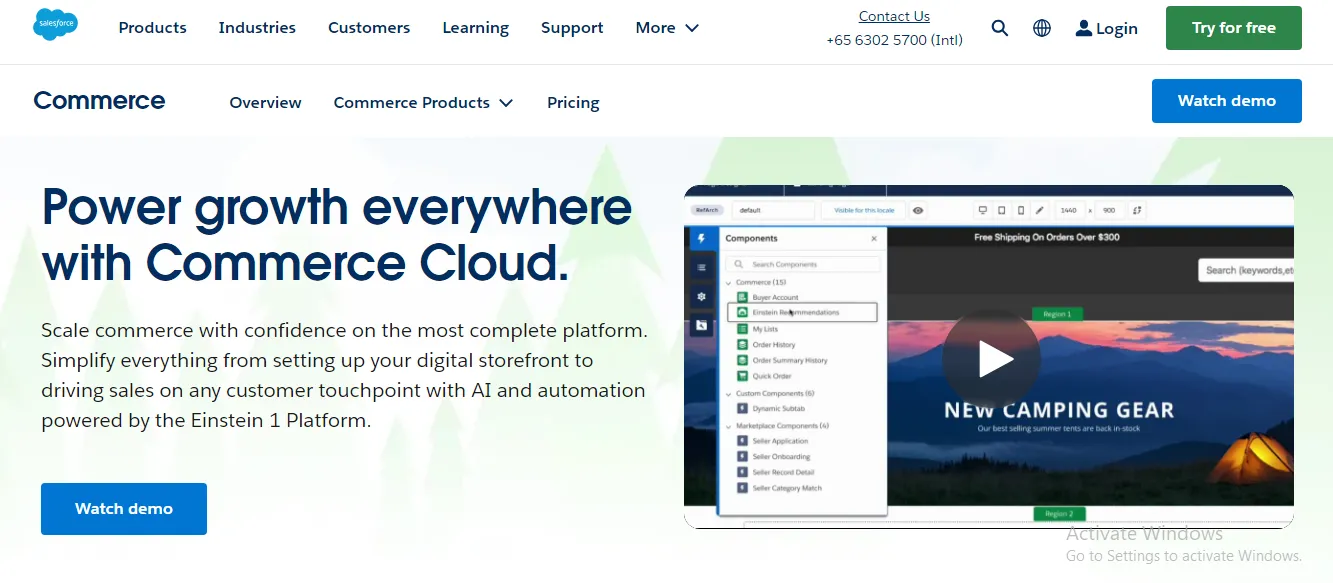
Much like Shopify Plus discussed above, Salesforce Commerce Cloud is also built for scalability. You can run multiple storefronts under different brands – each with its own URL – to serve diverse markets and adjust seamlessly for local currencies. Such a level of flexibility is what Ecwid has yet to master!
Also, in 2023, Salesforce upped the game by introducing two new AI products, Commerce GPT and Marketing GPT. They help businesses automate workflows, craft personalized emails, generate templates, and many other tasks that used to eat up hours. This multitasking ability is a huge step over Ecwid, which still requires you to install individual apps for each task (e.g., installing “AI for Product Descriptions” to generate descriptions only).
However, one sticking point is the lack of a fixed pricing plan. You'll have to contact Salesforce's sales team to get a custom quote, which can be daunting for those new to eCommerce or who prefer straightforward pricing. Not to mention, the platform's setup and adjustments still lean heavily on coding knowledge, adding extra time and cost to your project.
Salesforce Commerce Cloud | Pros | Cons |
 | + Excellent scalability + Robust, multi-tasking AI tools + Modern multi-store architecture | + Requires coding and technical knowledge + No fixed pricing + Not integrates easily with third-party tools |
Overall, Salesforce Commerce Cloud is ideal for large-scale, fast-growing businesses or global brands that need multiple storefronts and channels to grow. We also highly recommend it if you're looking for cutting-edge AI automation and don't mind a bit of a tech-heavy setup. On the other hand, for smaller businesses or beginners who value simplicity, Ecwid and other subscription-based models might still be a better fit.
10. Wix
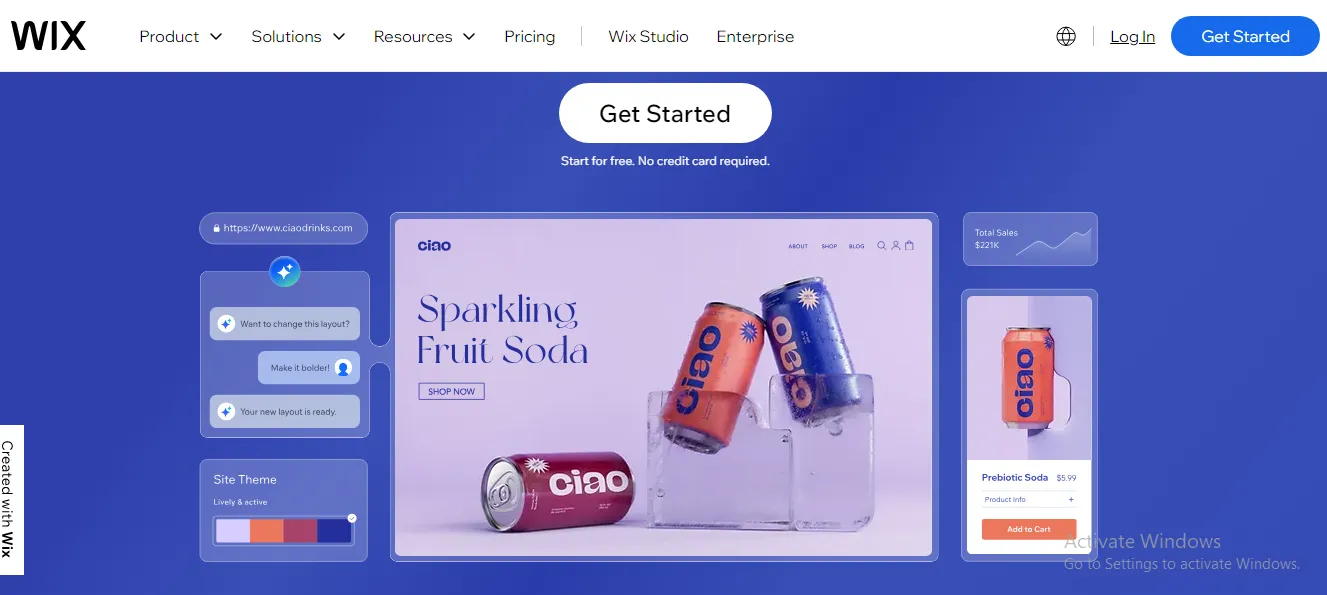
Last but not least, if you're on the hunt for a very affordable Ecwid alternative that still balances ease of use and flexibility, Wix might just catch your eye! Its ultra-smooth drag-and-drop editor simplifies the design process down to a few clicks. Whether adding text, images, videos, or any other content, you just need to drag it to your desired spot on the page!
And when it comes to pricing, Wix is the true champion on our entire list of Ecwid competitors. Sure, the Business Elite plan is priced at $159/month, but if you're not looking to go all-in at that level, the other three plans are pretty budget-friendly ($17, $29, and $36 per month, respectively). Not to mention, Wix's app store is packed with over 800 apps that are either free or operate on a freemium model; you only have to pay for what you really need!
That being said, Wix isn't strictly an eCommerce platform, meaning it caters to all kinds of sites, from portfolios to personal blogs. As a result, its online store features aren't as laser-focused as Ecwid or other alternatives. Likewise, not all the 800+ apps above are built for eCommerce, so it takes a bit of hunting to find exactly what you want.
Wix | Pros | Cons |
 | + Very easy to use + Extremely affordable + 800+ app integrations | +Not strictly an eCommerce platform + Doesn’t allow template changes once the site is live + Storage limits for all plans |
All in all, if you're not a full-blown online retailer but need an all-around versatile site with some selling power, Wix is a fantastic choice (we also mentioned this in our Wix review). For those who want to focus entirely on eCommerce, though, it might be worth looking elsewhere.
Is It Possible To Migrate Between Ecwid Alternatives?
If you already run your business on Ecwid (or any of the platforms mentioned above) and want a smooth migration to a new one, there's no need to stress. LitExtension #1 eCommerce Migration Expert is here to make that dream a reality!
With LitExtension, you have two incredible Ecwid migration packages at your fingertips:
- Basic Migration: This package lets you be in control. Simply set up your current store (e.g., Ecwid) as the source cart, choose your new platform as the target cart, select the data to transfer, and run the migration! And no, you won't be going in blindly, as there's a free demo that lets you take the process for a spin before fully committing.
- All-in-One Migration (The Crowd Favorite): Looking for the ultimate hands-off experience? Our All-in-One Migration package is tailor-made for anyone who wants to sit back while our team handles the heavy lifting. Just tell us what you need, make your payment, and we'll take it from there. Additional options (like removing HTML tags or setting up 301 redirects) are included at zero cost – not to mention all the dedicated post-migration support!
Ecwid Alternatives: FAQs
What are the downsides of Ecwid?
Ecwid's SEO tools and app store leave users wanting more and lag pretty far behind some competitors. Not to mention, some customization tasks demand a bit of know-how in custom CSS - quite a roadblock for those without technical expertise.
Is Ecwid better than WooCommerce?
It depends on your needs.
All in all, Ecwid shines as the go-to choice for beginners and small businesses working with limited resources. Meanwhile, WooCommerce is perfect for growing businesses and tech-savvy users who want full control over customization and the ability to scale their online store. You can check our Ecwid vs WooCommerce comparison for more details!
Is Ecwid cheaper than Shopify?
Yes. Ecwid's plans start as low as $0 and go up to $89/month (if you choose the annual payment option). Plus, the extra costs are relatively modest.
Shopify, on the other hand, comes with three core plans that range from $19 to $299 per month when billed annually. And if you're running a larger operation, Shopify Plus starts at a hefty $2,300 per month!
Curious to see how these two stack up in other areas? Check out our Ecwid vs Shopify comparison for all the details.
Final Words
And that wraps up our detailed breakdown of the top 10 Ecwid alternatives.
Once you’ve found your match, why wait around to get started? Let LitExtension handle the heavy lifting and transform your migration experience! With over 12 years of expertise and a track record of migrating more than 300,000 stores, we’ll make sure your Ecwid migration is smooth, accurate, and as effortless as possible.
For more information, check out our Ecwid guides and join our Facebook Community.

